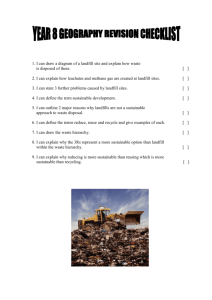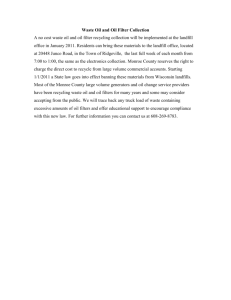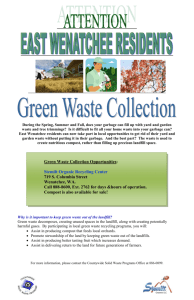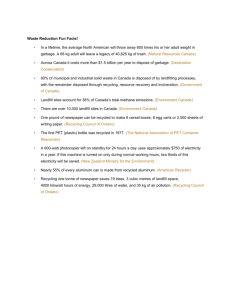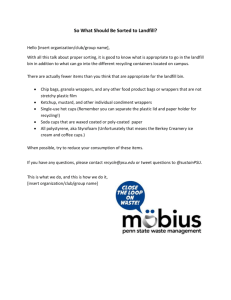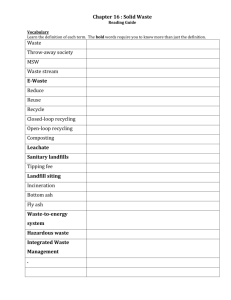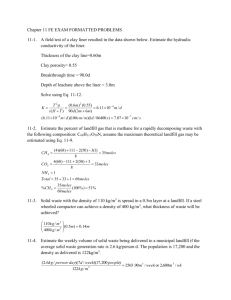Minutes - COJ.net
advertisement
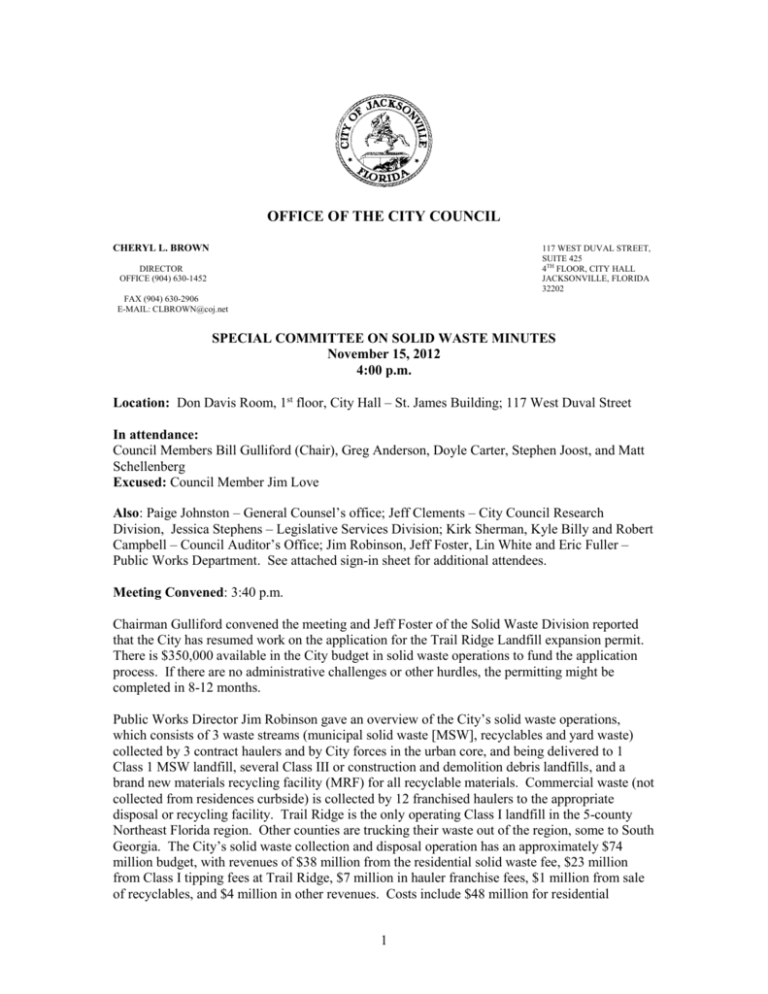
OFFICE OF THE CITY COUNCIL CHERYL L. BROWN 117 WEST DUVAL STREET, SUITE 425 4TH FLOOR, CITY HALL JACKSONVILLE, FLORIDA 32202 DIRECTOR OFFICE (904) 630-1452 FAX (904) 630-2906 E-MAIL: CLBROWN@coj.net SPECIAL COMMITTEE ON SOLID WASTE MINUTES November 15, 2012 4:00 p.m. Location: Don Davis Room, 1st floor, City Hall – St. James Building; 117 West Duval Street In attendance: Council Members Bill Gulliford (Chair), Greg Anderson, Doyle Carter, Stephen Joost, and Matt Schellenberg Excused: Council Member Jim Love Also: Paige Johnston – General Counsel’s office; Jeff Clements – City Council Research Division, Jessica Stephens – Legislative Services Division; Kirk Sherman, Kyle Billy and Robert Campbell – Council Auditor’s Office; Jim Robinson, Jeff Foster, Lin White and Eric Fuller – Public Works Department. See attached sign-in sheet for additional attendees. Meeting Convened: 3:40 p.m. Chairman Gulliford convened the meeting and Jeff Foster of the Solid Waste Division reported that the City has resumed work on the application for the Trail Ridge Landfill expansion permit. There is $350,000 available in the City budget in solid waste operations to fund the application process. If there are no administrative challenges or other hurdles, the permitting might be completed in 8-12 months. Public Works Director Jim Robinson gave an overview of the City’s solid waste operations, which consists of 3 waste streams (municipal solid waste [MSW], recyclables and yard waste) collected by 3 contract haulers and by City forces in the urban core, and being delivered to 1 Class 1 MSW landfill, several Class III or construction and demolition debris landfills, and a brand new materials recycling facility (MRF) for all recyclable materials. Commercial waste (not collected from residences curbside) is collected by 12 franchised haulers to the appropriate disposal or recycling facility. Trail Ridge is the only operating Class I landfill in the 5-county Northeast Florida region. Other counties are trucking their waste out of the region, some to South Georgia. The City’s solid waste collection and disposal operation has an approximately $74 million budget, with revenues of $38 million from the residential solid waste fee, $23 million from Class I tipping fees at Trail Ridge, $7 million in hauler franchise fees, $1 million from sale of recyclables, and $4 million in other revenues. Costs include $48 million for residential 1 collection, $13.7 million for landfill operations, and $11 million for landfill closure and remediation. The Public Works Department has explored various waste disposal options over the last 30 years, including transfer stations, waste-to-energy plants, mass burn technology, more recycling, refusederived fuel, and thermal gasification technology. Thus far none have proven to be sufficiently tested, reliable and cost-effective compared to conventional technologies. The City is about to kick off a new recycling promotion campaign to emphasize that with the opening of the new MRF, almost any household waste except food waste is now recyclable. Promotion of increased recycling is important because each ton of material diverted from the landfill to the MRF saves the City the $29 landfill tipping fee, produces $41 in revenue from the sale of the recyclable materials, and extends the life of the Trail Ridge Landfill. The overall waste trends in the City over the past 5 years show the amount of recycling holding very steady, commercial and residential MSW declining slowly, and C&D debris tonnage falling sharply. The committee discussed transfer stations with several of the franchise haulers in attendance. One representative said that 25-30 miles of transit from the collection route to the landfill is the breakeven point at which it makes sense to utilize transfer stations to consolidate and carry the waste in larger vehicles rather than neighborhood packer trucks. Transfer stations save the haulers in fuel costs, non-productive personnel time and wear and tear on vehicles, but there is a capital cost to construct and equip the transfer stations, a cost to double-handle the waste, and the cost of transport from the transfer station to the landfill that has to be borne by someone, either the City or a private company or perhaps a joint venture. The committee discussed landfill cover issues. Dredge spoil from the St. Johns River maintenance dredging or deepening is not practical to use for daily cover because it is too wet, has to be trucked too far, and may have environmental permitting challenges. Dirt from the City’s ash remediation sites is already being accepted and managed at the landfill. can be used once the EPA agrees and permits are obtained. The City is looking at City-owned land just south of Trail Ridge to use as a source for borrow pit for daily final cover that would have the advantage of very short transport distance. In response to a question, Jim Robinson said he will be ready by the first of December to discuss the status of the questions about Old Kings Road Landfill and the City’s host fee. Council Member Anderson reported that he had talked to a company that has a waste-to-energy process that converts garbage to diesel fuel. The U.S. military is apparently interested in alternative fuel generation capabilities, so perhaps with our strong military presence this is a field that Jacksonville should explore. In response to a question, Robert Campbell of the Council Auditor’s Office reported that JEA is not currently burning yard waste in their coal plant at the St. Johns River Power Park Northside Generating Station because the Florida DEP City has ruled that informed the utility that it would need a solid waste processing permit certificate of need for its preparation of the tree trimming waste to go into the boilers. The JEA is currently determining whether to apply for the permit CON to process its own tree trimming waste or to hire a contractor to supply pre-chipped wood waste. There was a discussion of landfilling plastic bags in C&D landfills. One of the contract haulers stated that Jacksonville is a very rare jurisdiction in allowing yard waste to be bagged in plastic bags and those bags to be placed in the landfill. Most jurisdictions have gone to requiring paper bags for yard waste, which are easily biodegradable. 2 The committee’s next meeting will be on November 28th at 3:30 p.m. Meeting adjourned: 4:44 p.m. Minutes: Jeff Clements, Council Research Division 11.19.12 Posted: 9:00 a.m. Tape: Special Committee on Solid Waste 11.15.12 Legislative Services Division 3

